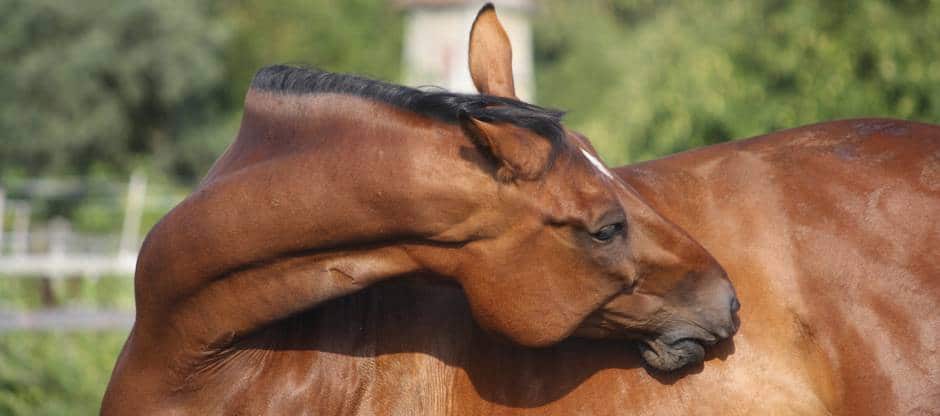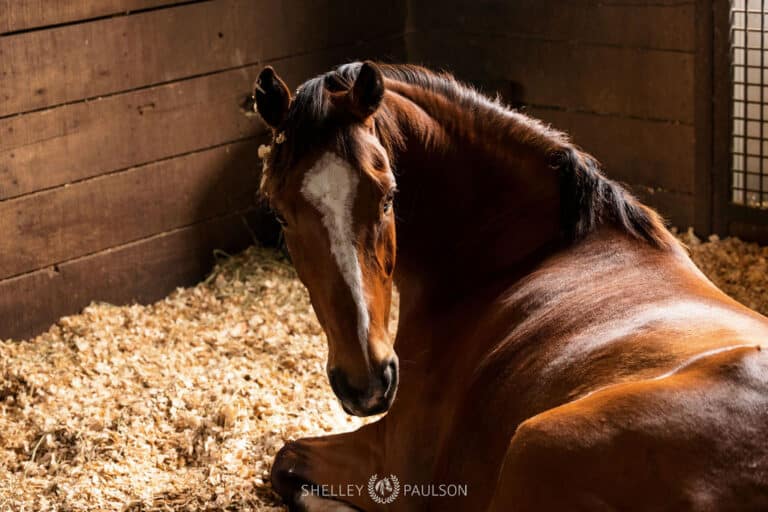Colic refers to abdominal pain from any cause. KER’s PETER HUNTINGTON B.V.Sc., M.A.C.V.Sc. explains the specifics.
Colic, loosely defined as abdominal pain from any cause, is very common in horses. It’s one of the most significant disorders a horse can suffer as it’s often very painful and some cases are life threatening. While the cause is often not identified impaction, overproduction of intestinal gas, infection, hindgut acidosis, twists, and displacement of the colon are frequently to blame.
Most horses that suffer a bout of colic will recover, often without veterinary treatment, and go on for years without a return of the condition. However, a smaller number of horses develop signs of colic again and again, sometimes seemingly related to changes in the weather or their feed, stabling, teeth, cribbing or weaving, or some other factor such as worming. Finding and eliminating the cause of these episodes is often difficult and frustrating for owners.
The veterinary examination of a horse with recurrent colic can involve a number of procedures, usually beginning with obvious things like a check of dental condition, analysis of blood and faeces, and rectal palpation. A detailed history of the horse’s exercise program and feeding plan may indicate the need for changes in management. Endoscopic examination of the stomach may show the presence of gastric ulcers, often found in performance horses with recurrent mild colic being one of the typical signs.
Colic can also be related to organs apart from the intestines, and a more extensive examination can detect problems with the heart, lungs, or liver. Ultrasounds can be used to identify tumours, enteroliths, sand accumulation, and unusual thickening of the intestinal walls. Exploratory abdominal surgery to find a cause of recurrent colic is not done without some risks to the horse, and this procedure may or may not locate a specific cause that can be treated.

Prevention of recurrent colic depends on the factors related to the horse’s discomfort. In cases where no obvious cause is identified, management changes may be helpful. Based on our current knowledge of colic prevention, horse owners are encouraged to maximize the health of the hindgut, where fermentation occurs.
Useful strategies include ensuring the horse always has access to clean water; maximizing turnout time; and basing the diet on ad lib good-quality forage, with grain or concentrates added only if it is necessary to support the energy demands of exercise, pregnancy, lactation or growth.
Diet changes should be made slowly to support hindgut health and feeding a research proven, time release hindgut buffer may also be beneficial for preventing hindgut acidosis and subsequent changes in the microbiome.
For more information go to Colic Episodes, Colic Risk Factors, Small Intestinal Colic, and Large intestinal Colic.
Dr. Peter Huntington B.V.Sc., M.A.C.V.Sc.
A graduate of the University of Melbourne, Peter has enjoyed a distinguished career specialising in equine nutrition. In 1999, he was appointed Director of KER Australasia. He travels widely to consult and lecture on equine nutrition and is the author of Horse Sense – The Guide to Horse Care in Australia and New Zealand. In this issue he discusses the problem of mild recurrent colic



